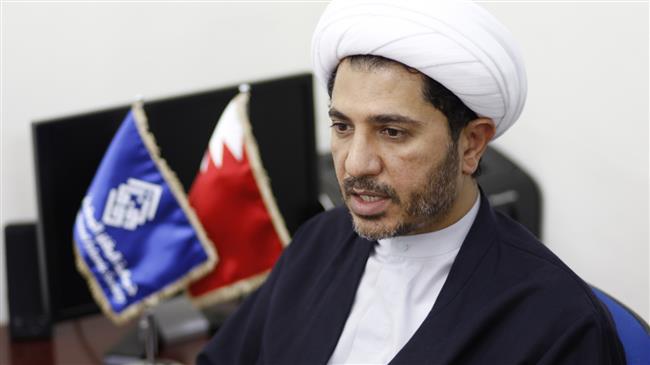
They also called for an end to the “prosecution of political dissidents and human rights activists for exercising their right to freedom of expression,” demanding the Manama regime to stop using legislation to “criminalize the peaceful practice of freedom of opinion and expression.”
On November 1, 2017, the 52-year-old secretary general of the dissolved al-Wefaq National Islamic Society and two of his colleagues, Hassan Sultan and Ali al-Aswad, were charged with “spying on behalf of a foreign country... with the aim of carrying out subversive acts against Bahrain and harming its national interests.”
Sheikh Salman was also charged with “revealing defense secrets to a foreign country and disseminating information that would harm Bahrain's status and reputation.”
The senior Bahraini Shia cleric has been in jail on a nine-year prison sentence since late 2014 for what the Manama regime has called “insulting” government officials, “inciting” unrest through his speeches targeting the authorities during the 2011 uprising, attempting to overthrow the regime and collaborating with foreign powers.
Sheikh Salman denies all the charges, saying he has merely been seeking reforms in the country through peaceful means.
Amnesty International and other human rights groups have already censured his arrest and called for his release.
Thousands of anti-regime protesters have held demonstrations in Bahrain on an almost daily basis ever since a popular uprising began in the country in mid-February 2011.
They are demanding that the Al Khalifah dynasty relinquish power and allow a just system representing all Bahrainis to be established.
Manama has gone to great lengths to clamp down on any sign of dissent. On March 14, 2011, troops from Saudi Arabia and the United Arab Emirates were deployed to assist Bahrain in its crackdown.
According to Press TV, scores of people have lost their lives and hundreds of others sustained injuries or got arrested as a result of the Al Khalifah regime’s crackdown.
On March 5, 2017, Bahrain’s parliament approved the trial of civilians at military tribunals in a measure blasted by human rights campaigners as being tantamount to imposition of an undeclared martial law countrywide.
Bahraini monarch King Hamad bin Isa Al Khalifah ratified the constitutional amendment on April 3 last year.
847/940